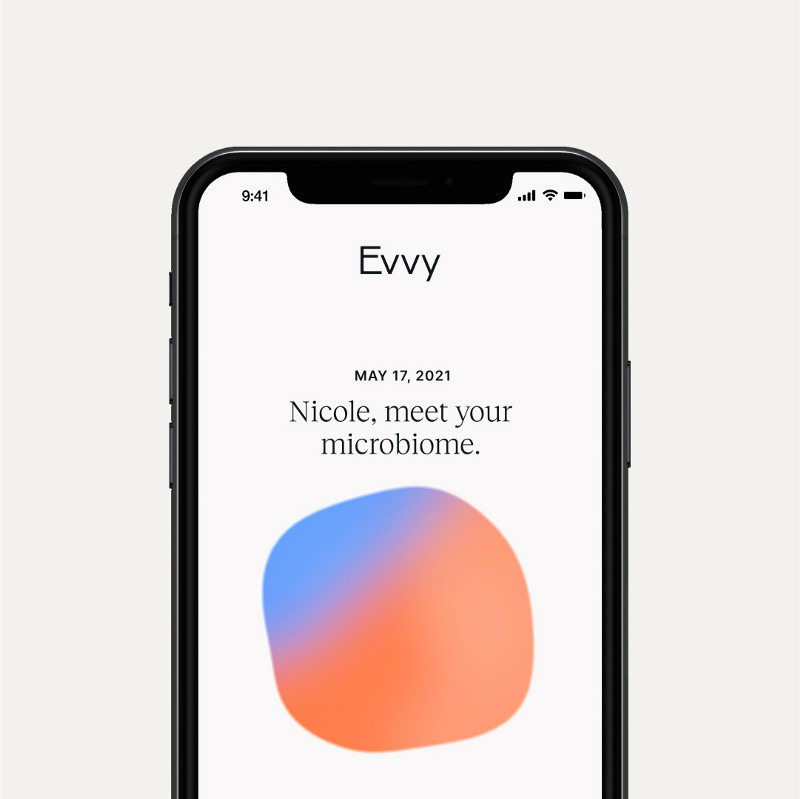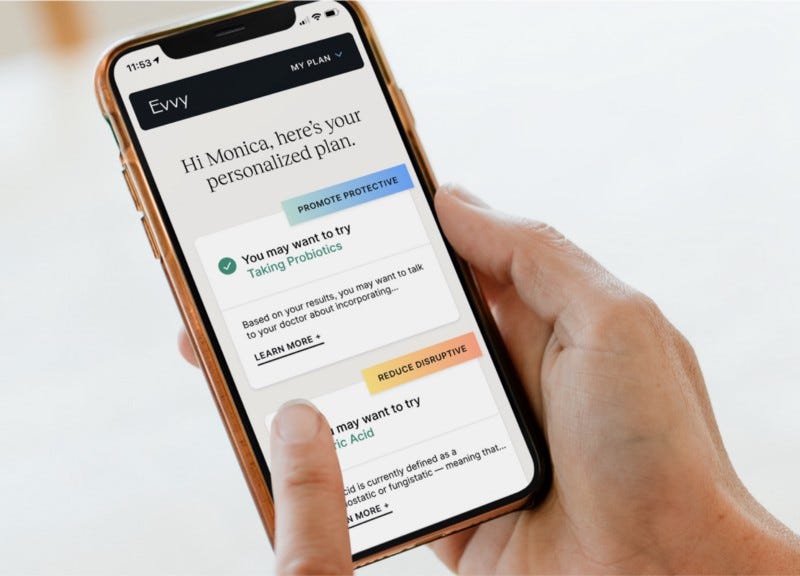Decoding The Vaginal Microbiome With Evvy’s Co-Founders
Despite all of the innovation in women’s health in recent years, we believe that there are still many needs, experiences, and conditions…
Despite all of the innovation in women’s health in recent years, we believe that there are still many needs, experiences, and conditions throughout a woman’s life stages that remain underserved by mainstream healthcare. Priyanka Jain and Laine Bruzek, co-founders of Evvy, are on a mission to bring awareness to an essential component of a woman’s health at every life stage that has been until now, relatively unknown: the vaginal microbiome.
Evvy’s goal is to close the gender health gap. To do that, they’ve created an at-home vaginal microbiome test that gives women unprecedented insight into their health and contributes to Evvy’s ongoing research on female biomarkers and how they can be leveraged to detect and treat a variety of critical health conditions.
We recently sat down with Priyanka and Laine to talk about why there is so little awareness of the vaginal microbiome, how Evvy is changing health outcomes for women and people with vaginas, and how to build a brand that will reach women of all ages.
What inspired you to start Evvy?
Priyanka Jain: Evvy’s mission is to make sure that the ways we’ve defined health actually include the female body. If you think about so many of the markers of health today, they’re based on a middle-aged, mid-sized man. How do we start thinking about markers of health that uniquely exist in the female body?
The vaginal microbiome is a perfect place to start. Not only is it the cause of some of the most common infections in women, like yeast infections, urinary tract infections, and bacterial vaginosis, but it also has broad health implications on things like STI acquisition, preterm birth, fertility concerns, and cervical cancer progression.
Women have no access to that information on their own bodies, and no one in the healthcare system is using data to help women make better health decisions. We started Evvy to change all that.
Laine Bruzek: Vaginas are treated like a liability — basically a taboo. They’re an amazing, resilient, complex body part, and they deserve just as much care as our arms, legs, brain, skin, and everything else. Oftentimes, we go through these care journeys with vaginal health by ourselves and with a lot of embarrassment and shame.
I’m particularly excited to bring vaginal health into the spotlight and find ways that we can help connect women not just to better healthcare, but also to each other. How do we help break down some of the barriers that prevent people from talking about their vaginal health?
Given how important vaginal health is, why do you think there is so little awareness around it?
Priyanka: I think it comes down to: “where did we put our money and where did we put the research dollars?” Women weren’t even required to be in clinical research until 1993. We’re continuously feeling the repercussions of that huge gap in understanding the female body.
There’s a systemic lack of women’s representation in these studies, in research, in medicine, and in funding: and we feel the impact of that gap in understanding the female body to this day.
On top of that, the type of technology we’re using and the things we’re able to do either didn’t exist or were not financially feasible until the past 5–10 years. What we’re seeing is the intersection of technological changes and the affordability of that technology with the desire to have a much more inclusive definition of health.
How is Evvy changing health outcomes for your customers?
Priyanka: The first and most important thing is giving people information on their own bodies. So many women feel like they’re “crazy” at one point or another in their health journey. I think we’ve all been there! You say, “I think something is going on with me,” and everyone says, “You’re fine, you’re fine, you’re fine.”
We’re helping women understand, to the highest fidelity we can, what’s going on with their own bodies so they can decide what is “fine” or not fine for them.
The female body isn’t a bunch of binaries — it’s actually a lot of complex components coming together. How can we help someone really understand that?
With the vaginal microbiome, that might mean helping someone get to the right diagnosis faster with their doctor, find the right treatment more quickly, reduce recurrence rates of their condition, catch potential imbalances before they turn into full-blown infections, or find something in their vaginal microbiome that might have been affecting another aspect of their health that they didn’t even know was related.
What makes the Evvy at-home test different from other tests women might get? How are you thinking about the customer experience?
Laine: What we’re doing is helping to make sure the question is right. You can’t get to the right answer unless you have the right question. Tests right now are asking, “Are these five pathogens present: yes or no?” We’re asking, “What is present?” which is a new way of thinking about testing.
Something that goes hand in hand with this is creating personalized, proactive education for our users to help them ask the right questions in their doctor’s office. Because a lot of vaginal infections have similar symptoms, most women know to ask the question “is it itchy?” but that’s where their literacy about vaginal health challenges might stop. That’s a failure of the healthcare system and general health education. We’re excited to help women ask better questions of their own bodies so they can get better answers from their doctors.
Evvy can help any person with a vagina: how do you build a brand that will reach a Gen Z woman as well as a woman going through menopause?
Laine: No matter your age, every woman has had the experience of feeling misdiagnosed, under-diagnosed, or dismissed at the doctor’s office. I think that’s unfortunately a pretty universal experience for female-bodied people, which means there are so many opportunities to tell stories that resonate no matter the age group.
Along the way, there are things that we keep front-and-center that never change. Things like science-forward but human language. Treating women like they’re smart, not gatekeeping them from better information about their bodies.
What is really amazing about having a science-forward brand is that it resonates across all age groups. All women want to have better body literacy so that they can have better conversations with themselves, with people in their life, and with their doctors. It’s pretty fun to be that friend in health research for all women, regardless of age.
The past 18 months have been transformative for healthcare, and the sector is continuing to evolve rapidly. What changes do you think will stick, and where does Evvy fit into the future?
Priyanka: The first major trend is people being in control of their own health. During COVID, we saw health become something that everyone was thinking about all the time. From small things like, “I can wash my hands” or “I can socially distance” to “I can test myself for an infection,” suddenly people had a lot more control over their health and wanted a lot more information. The concept of at-home testing obviously existed before, but now when we send people our kits, all of these things are very familiar.
The second is that a lot of the barriers to telehealth fell down. Whether those barriers were cultural, from the medical system, or regulatory, we were able to prove to doctors, patients, and to the regulatory system that certain parts of the healthcare system function pretty well online.Telehealth could never handle 100% of healthcare, but it can handle a much higher percentage than we assumed before COVID.
The beauty of that is people anywhere in the world can start to access much better healthcare because it doesn’t have to be in their neighborhood. One of our goals at Evvy is to make really great women’s healthcare accessible anywhere. I don’t think that’s the case right now.
Now that you guys have closed out your Seed, what are your top priorities for Evvy?
Priyanka: Our top priority is always to make sure that we are providing the most value that we possibly can to our customers, whether it’s through additional services or using our research to make our platform more valuable to them.
Last question. Who inspires you?
Laine: I’m inspired by the women we’ve spoken to who have had traumatic experiences in the healthcare system and turned them into a foundation for community advocacy and education. One of my best friends, Emma, is a great example — she had a years-long journey with PMDD (another massively under-researched female health condition!) — and the first thing she did when she felt like an expert was to turn around and teach a bunch of other people online about her symptoms, her experiences, and how to navigate doctors and insurance. I’m very inspired to build Evvy in the same way — to build better tools, research, and education, and to give that right back to the community that is most in need of it.
We always say that we don’t keep things in “research land,” which means making sure that we take all of the amazing discoveries we make and turn those into tangible, actionable, and useful information for people day-to-day.
Priyanka: I just got off the phone with a customer today who has dealt with vaginal infections for years. She probably spends two hours a day in online communities just answering people’s questions. Sometimes she will direct-message people and tell them they’re going to get through it. She’s truly motivated by this concept of paying it forward.
In an area where so many women feel isolated, it’s amazing to me how many people take it upon themselves to be a voice of comfort, reassurance, strength, and power, even when there is nothing in it for them. I’m inspired thinking about how we can scale that and give those women a platform. They are really the backbone that’s been helping women get through health issues for the decades before Evvy existed.
Interested in joining the team? Evvy is hiring across product, marketing, engineering, research, and data science. Explore open roles here.




